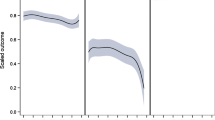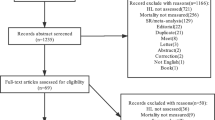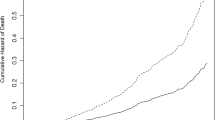Abstract
BACKGROUND: While limited literacy is common and its prevalence increases with age, no prospective study has assessed whether limited literacy is associated with mortality in older adults.
OBJECTIVE: To assess the association of limited literacy with mortality.
DESIGN AND SETTING: Five-year prospective study from 1999 to 2004 of community-dwelling elders from Memphis, TN, and Pittsburgh, PA, who were from the Health, Aging, and Body Composition study. Subjects’ literacy was assessed with the Rapid Estimate of Adult Literacy in Medicine. Scores were categorzied into limited (0 to 8th grade reading level) or adequate literacy (≥9th grade reading level).
PARTICIPANTS: Two thousand five hundred and twelve black and white elders without baseline functional difficulties or dementia.
MEASUREMENTS: Time to death.
RESULTS: Participants’ mean age was 75.6 years, 48% were male, 38% were black, and 24% had limited literacy; the median follow-up time was 4.2 years. Compared with those with adequate literacy, those with limited literacy had a higher risk of death (19.7% vs 10.6%) with a hazard ratio (HR) of 2.03 (95% confidence intervals [CI], 1.62 to 2.55). After adjusting for demographics and socioeconomic status, co-morbid conditions, self-rated health status, health-related behaviors, health care access measures, and psychosocial status, limited literacy remained independently associated with mortality (HR 1.75; 95% CI, 1.27 to 2.41).
CONCLUSIONS: Limited literacy is independently associated with a nearly 2-fold increase in mortality in the elderly. Given the growth of the aging population and the prevalence of chronic diseases, the mechanisms by which limited literacy is associated with mortality in the elderly warrant further investigation.
Similar content being viewed by others
References
Kirsch IS, Jungeblut A, Jenkins L, Kolstad A. Adult Literacy in America: A First Look at the Findings of the National Adult Literacy Survey. Washington, DC: Office of Educational Research and Improvement U.S. Department of Education; 1993. Available at: http://nces.ed.gov/pubs93/93275.pdf. Accessed December 3, 2005.
Paasche-Orlow MK, Parker RM, Gazmararian JA, Nielsen-Bohlman LT, Rudd RR. The prevalence of limited health literacy. J Gen Intern Med. 2005;20:175–84.
Williams MV, Parker RM, Baker DW, et al. Inadequate functional health literacy among patients at two public hospitals. JAMA. 1995;274:1677–82.
Kalichman SC, Benotsch E, Suarez T, Catz S, Miller J, Rompa D. Health literacy and health-related knowledge among persons living with HIV/AIDS. Am J Prev Med. 2000;18:325–31.
Williams MV, Baker DW, Parker RM, Nurss JR. Relationship of functional health literacy to patients’ knowledge of their chronic disease. A study of patients with hypertension and diabetes. Arch Intern Med. 1998;158:166–72.
Williams MV, Baker DW, Honig EG, Lee TM, Nowlan A. Inadequate literacy is a barrier to asthma knowledge and self-care. Chest. 1998;114:1008–15.
Baker DW, Parker RM, Williams MV, Clark WS, Nurss J. The relationship of patient reading ability to self-reported health and use of health services. Am J Public Health. 1997;87:1027–30.
Baker DW, Gazmararian JA, Williams MV, et al. Functional health literacy and the risk of hospital admission among medicare managed care enrollees. Am J Public Health. 2002;92:1278–83.
Schillinger D, Grumbach K, Piette J, et al. Association of health literacy with diabetes outcomes. JAMA. 2002;288:475–82.
Huisman M, Kunst AE, Andersen O, et al. Socioeconomic inequalities in mortality among elderly people in 11 european populations. J Epidemiol Community Health. 2004;58:468–75.
Huisman M, Kunst AE, Bopp M, t al. Educational inequalities in cause-specific mortality in middle-aged and older men and women in eight western European populations. Lancet. 2005;365:493–500.
Guralnik JM, Land KC, Blazer D, Fillenbaum GG, Branch LG. Educational status and active life expectancy among older blacks and whites. N Engl J Med. 1993;329:110–6.
Yach D, Dawkes C, Gould CL, Hofman KJ. The global burden of chronic diseases: overcoming impediments to prevention and control. JAMA. 2004;291:2616–22.
Harris TB, Visser M, Everhart J, et al. Waist circumference and sagittal diameter reflect total body fat better than visceral fat in older men and women. The health, aging and body composition study. Ann NY Acad Sci. 2000;904:462–73.
American Psychiatric Association. Diagnostic and Statistical Manual of Mental Disorders, Revised Fourth Edition. Washington, DC: American Psychiatric Association; 2000.
Davis TC, Long SW, Jackson RH, et al. Rapid estimate of adult literacy in medicine: a shortened screening instrument. Fam Med. 1993;25:391–5.
Parker RM, Baker DW, Williams MV, Nurss JR. The test of functional health literacy in adults: a new instrument for measuring patients’ literacy skills. J Gen Intern Med. 1995;10:537–41.
Andresen EM, Malmgren JA, Carter WB, Patrick DL. Screening for depression in well older adults: evaluation of a short form of the CES-D (center for epidemiologic studies depression scale). Am J Prev Med. 1994;10:77–84.
Mehta KM, Simonsick EM, Penninx BW, et al. Prevalence and correlates of anxiety symptoms in well-functioning older adults: findings from the health aging and body composition study. J Am Geriatr Soc. 2003;51:499–504.
Teng EL, Chui HC. The modified mini-mental state (3MS) examination. J Clin Psychiatry. 1987;48:314–8.
Yaffe K, Lindquist K, Penninx BW, et al. Inflammatory markers and cognition in well-functioning African-American and white elders. Neurology. 2003;61:76–80.
Ives DG, Fitzpatrick AL, Bild DE, et al. Surveillance and ascertainment of cardiovascular events. The cardiovascular health study. Ann Epidemiol. 1995;5:278–85.
D’Agostino RB Jr. Propensity score methods for bias reduction in the comparison of a treatment to a non-randomized control group. Stat Med. 1998;17:2265–81.
Baker DW, Gazmararian JA, Sudano J, Patterson M, Parker RM, Williams MV. Health literacy and performance on the mini-mental state examination. Aging Ment Health. 2002;6:22–9.
Weiss BD, Reed R, Kligman EW, Abyad A. Literacy and performance on the mini-mental state examination. J Am Geriatr Soc. 1995;43:807–10.
Vittinghoff E, Glidden DV, Shiboski SC, McCulloch CE. Regression Methods in Biostatistics: Linear, Logistic, Survival, and Repeated Measures Models. New York: Springer; 2005.
STATA Statistics/Data Analysis. Intercooled, Version 8.0, College Station, TX, Available at http://www.stata.com. Accessed December 3, 2005.
Gazmararian JA, Baker DW, Williams MV, et al. Health literacy among medicare enrollees in a managed care organization. JAMA. 1999;281:545–51.
Sudore RL, Mehta KM, Simonsick EM, et al. Limited literacy in older people and disparities in health and healthcare access. J Am Geriatr Soc. 2006;54:770–6.
Gikhale MK, Rao SS, Garole VR. Infant mortality in india: use of maternal and child health services in relation to literacy status. J Health Popul Nutr. 2002;20:138–47.
Berhane Y, Hogberg U, Byass P, Wall S. Gender, literacy, and survival among ethiopian adults, 1987–96. Bull World Health Organ. 2002;80:714–20.
Scott TL, Gazmaraian JA, Williams MV, Baker DW. Health literacy and preventive health care use among medicare enrollees in a managed care organization. Med Care. 2002;40:395–404.
Baker DW, Gazmararian JA, Williams MV, et al. Health literacy and use of outpatient physician services by medicare managed care enrollees. J Gen Intern Med. 2004;19:215–20.
Baker DW, Parker RM, Williams MV, Clark WS. Health literacy and the risk of hospital admission. J Gen Intern Med. 1998;13:791–8.
Marwick C. Patients lack of literacy may contribute to billions of dollars in higher hospital costs. JAMA. 1997;278:971–2.
Binkley M, Matheson N, Williams TU. Department of Education. National Center for Education Statistics. Adult Literacy: An International Perspective. Washington, DC: U.S. Department of Education; 1997. Available at: http://nces.ed.gov/pubs97/9733.pdf. Accessed December 3, 2005.
Sum AM, Kirsch IS, Taggart R. The Twin Challenges of Mediocrity and Inequality. Princetion, NJ, 2002. Available at: http://www.nupr.neu.edu/03-02/ets.pdf. Accessed December 3, 2005.
Yaffe K, Blackwell T, Kanaya AM, Davidowitz N, Barrett-Connor E, Krueger K. Diabetes, impaired fasting glucose, and development of cognitive inpairment in older women. Neurology. 2004;63:658–63.
Yaffe K, Kanaya A, Lindquist K, et al. The metabolic syndrome. inflammation, and risk of cognitive decline. JAMA. 2004;292:2237–42.
Kanaya AM, Barrett-Connor E, Gildengorin G, Yaffe K. Change in cognitive function by glucose tolerance status in older adults: a 4-year prospective study of the rancho bernardo study cohort. Arch Intern Med. 2004;164:1327–33.
Richards M, Shipley B, Fuhrer R, Wadsworth ME. Cognitive ability in childhood and cognitive decline in mid-life: longitudinal birth cohort study. BMJ. 2004;328:552–6.
Wilson RS, Bennett DA, Bienias JL, Mendes de Leon CF, Morris MC, Evans DA. Cognitive activity and cognitive decline in a biracial community population. Neurology. 2003;61:812–6.
Marmot MG, Kogevinas M, Elston MA. Social/economic status and disease. Annu Rev Public Health. 1987;8:111–35.
Marmot MG, McDowall ME. Mortality decline and widening social inequalities. Lancet. 1986;2:274–6.
Mookadam F, Arthur HM. Social support and its relationship to morbidity and mortality after acute myocardial infarction: systematic overview. Arch Intern Med. 2004;164:1514–8.
Wong MD, Shapiro MF, Boscardin WJ, Ettner SL. Contribution of major diseases to dispartities in mortality. N Engl J Med. 2002;347:1585–92.
Pappas G, Queen S, Hadden W, Fisher G. The increasing disparity in mortality between socioeconomic groups in the united states, 1960 and 1986. N Engl J Med. 1993;329:103–9.
Singh-Manoux A, Ferrie JE, Chandola T, Marmot M. Socioeconomic trajectories across the life course and health outcomes in midlife: evidence for the accumulation hypothesis? Int J Epidemiol. 2004;33:1072–9.
Lynch JW, Kaplan GA, Shema SJ. Cumulative impact of sustained economic hardship on physical, cognitive, psychological, and social functioning. N Engl J Med. 1997;337:1889–95.
Institute of Medicine. Health Literacy: A Prescription to End Confusion. Washington, DC: National Academic Press; 2004.
Affairs AHCoHLftCoS. Health literacy: report of the council on scientific affairs. JAMA. 1999;281:552–7.
DeWalt DA, Malone RM, Bryant ME, et al. A heart failure self-management program for patients of all literacy levels: a randomized, controlled trial [ISRCTN1 1535170]. BMC Health Serv Res. 2006;6:1–30.
Rothman RL, DeWalt DA, Malone R, et al. Influence of patient literacy on the effectiveness of a primary care-based diabetes disease management program. JAMA. 2004;292:1711–6.
Author information
Authors and Affiliations
Corresponding author
Additional information
This study was supported by the NIH grants NIA N01-AG-6-2101, N01-AG-6-2103, and N01-AG-6-2106. Dr. Sudore was supported by the NIH Research Training in Geriatric Medicine Grant AG000212 and by the Pfizer Fellowship in Clear Health Communication. Dr. Schillinger was supported by an NIH Mentored Clinical Scientist Award K-23 RR 16539-03.
Rights and permissions
About this article
Cite this article
Sudore, R.L., Yaffe, K., Satterfield, S. et al. Limited literacy and mortality in the elderly. J GEN INTERN MED 21, 806–812 (2006). https://doi.org/10.1111/j.1525-1497.2006.00539.x
Issue Date:
DOI: https://doi.org/10.1111/j.1525-1497.2006.00539.x




